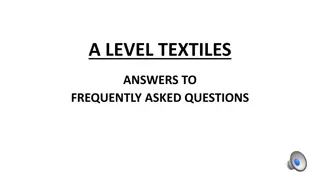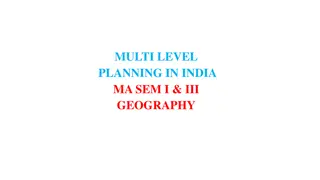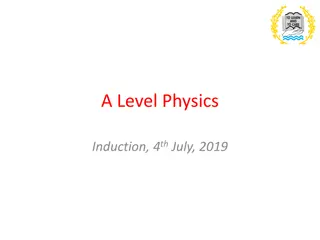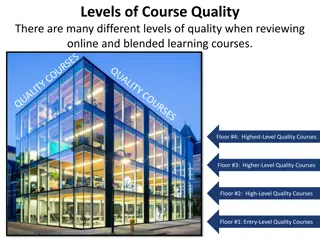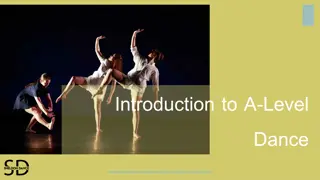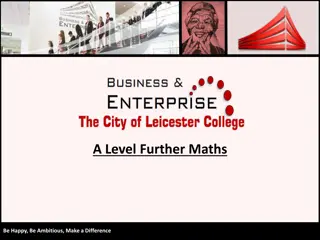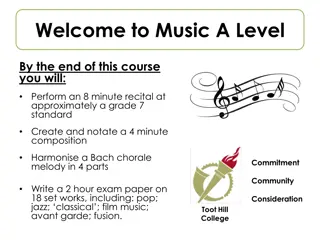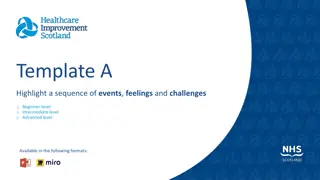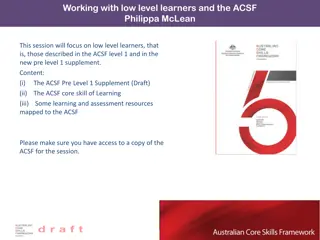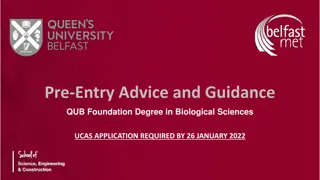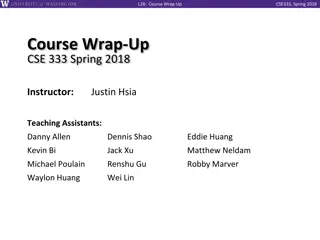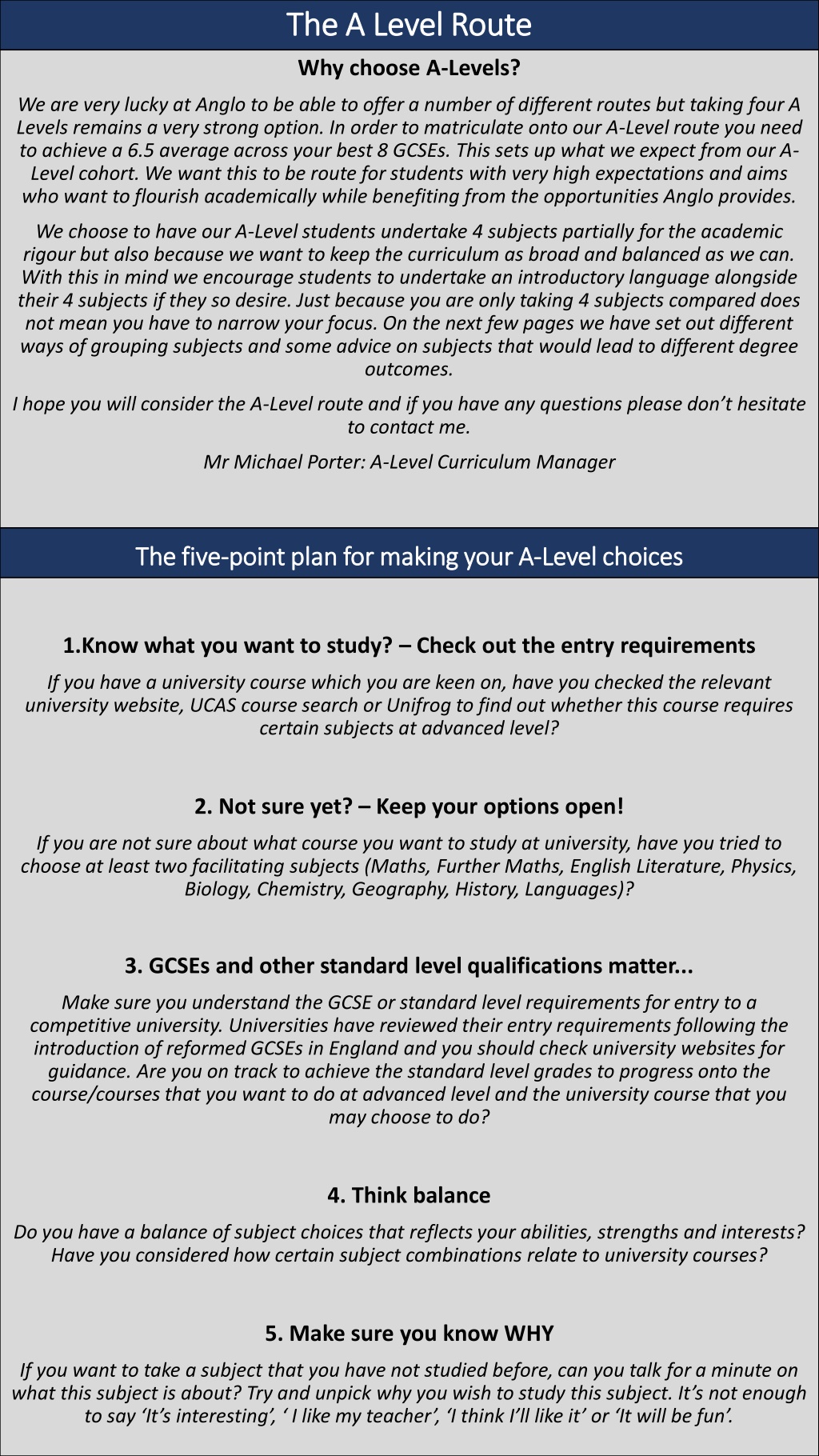
Making Informed Choices for Your A-Level Route
Learn about the importance of subject selection for A-Levels, understand university requirements, and explore different ways to choose subjects that align with your interests and goals.
Download Presentation

Please find below an Image/Link to download the presentation.
The content on the website is provided AS IS for your information and personal use only. It may not be sold, licensed, or shared on other websites without obtaining consent from the author. If you encounter any issues during the download, it is possible that the publisher has removed the file from their server.
You are allowed to download the files provided on this website for personal or commercial use, subject to the condition that they are used lawfully. All files are the property of their respective owners.
The content on the website is provided AS IS for your information and personal use only. It may not be sold, licensed, or shared on other websites without obtaining consent from the author.
E N D
Presentation Transcript
The A Level Route The A Level Route Why choose A-Levels? We are very lucky at Anglo to be able to offer a number of different routes but taking four A Levels remains a very strong option. In order to matriculate onto our A-Level route you need to achieve a 6.5 average across your best 8 GCSEs. This sets up what we expect from our A- Level cohort. We want this to be route for students with very high expectations and aims who want to flourish academically while benefiting from the opportunities Anglo provides. We choose to have our A-Level students undertake 4 subjects partially for the academic rigour but also because we want to keep the curriculum as broad and balanced as we can. With this in mind we encourage students to undertake an introductory language alongside their 4 subjects if they so desire. Just because you are only taking 4 subjects compared does not mean you have to narrow your focus. On the next few pages we have set out different ways of grouping subjects and some advice on subjects that would lead to different degree outcomes. I hope you will consider the A-Level route and if you have any questions please don t hesitate to contact me. Mr Michael Porter: A-Level Curriculum Manager The five The five- -point plan for making your A point plan for making your A- -Level choices Level choices 1.Know what you want to study? Check out the entry requirements If you have a university course which you are keen on, have you checked the relevant university website, UCAS course search or Unifrog to find out whether this course requires certain subjects at advanced level? 2. Not sure yet? Keep your options open! If you are not sure about what course you want to study at university, have you tried to choose at least two facilitating subjects (Maths, Further Maths, English Literature, Physics, Biology, Chemistry, Geography, History, Languages)? 3. GCSEs and other standard level qualifications matter... Make sure you understand the GCSE or standard level requirements for entry to a competitive university. Universities have reviewed their entry requirements following the introduction of reformed GCSEs in England and you should check university websites for guidance. Are you on track to achieve the standard level grades to progress onto the course/courses that you want to do at advanced level and the university course that you may choose to do? 4. Think balance Do you have a balance of subject choices that reflects your abilities, strengths and interests? Have you considered how certain subject combinations relate to university courses? 5. Make sure you know WHY If you want to take a subject that you have not studied before, can you talk for a minute on what this subject is about? Try and unpick why you wish to study this subject. It s not enough to say It s interesting , I like my teacher , I think I ll like it or It will be fun .
Different ways of selecting subjects. There is not a one size fits all way of selecting you A-Level subjects. There are a few different ways you might consider. First of all the obvious: four complementary subjects. In this case four scientific subjects. This student might be considering a future in medicine. Maths Biology Chemistry Physics However the same student might consider the Three and One path. In this case instead of physics they have selected art. To give their path some balance and perhaps to better reflect their interests. Having a different subject could help with motivation and keep yourself engaged. Languages fill this role very well but in this case a more science adjacent humanity might also fit nicely. Biology Chemistry Art Maths Finally you might have a student who is a little split on what path to take. For them they might consider Interlocking Pairs. This is where you take pairs of subjects that are well suited to form a concerted path. In the example below the student really wants to study Maths and History. Not necessarily natural bedfellows. So to create a cohesive path they have paired them up with a subject which in turn pairs nicely with the pair of the other. In this case History pairs nicely with Politics. Economics pairs nicely with Maths. Finally Politics pairs nicely with Economics. Maths Economics Politics History University Courses and Requirements University Courses and Requirements Accountancy (also Banking/Finance/Insurance) ESSENTIAL ADVANCED LEVEL QUALIFICATIONS: Usually none, although one or two universities require Mathematics. USEFUL ADVANCED LEVEL QUALIFICATIONS: Mathematics, Business Studies and Economics. Aeronautical Engineering ESSENTIAL ADVANCED LEVEL QUALIFICATIONS: Mathematics and usually Physics. USEFUL ADVANCED LEVEL QUALIFICATIONS: Further Mathematics, Design Technology, Computing/Computer Science. American Studies ESSENTIAL ADVANCED LEVEL QUALIFICATIONS: Requirements vary but English and/or History are often asked for. USEFUL ADVANCED LEVEL QUALIFICATIONS: Politics Architecture ESSENTIAL ADVANCED LEVEL QUALIFICATIONS: Some courses say they want an arts/science mix. Some may require Art. USEFUL ADVANCED LEVEL QUALIFICATIONS: Art, Mathematics, Design Technology and Physics. AGCE or National Art and Design may also be useful at some universities. Do note that a portfolio of drawings and ideas may be asked for.
Art and Design ESSENTIAL ADVANCED LEVEL QUALIFICATIONS: Art or Design Technology including AGCE/National (to give you the portfolio to get onto an Art Foundation Course, though sometimes AGCE/National Art and Design applicants go straight onto a degree). USEFUL ADVANCED LEVEL QUALIFICATIONS: Design Technology, Art & Design. Do note that most entrants onto Art and Design degrees will have done a one-year Art Foundation Course after completing Year 13. Biochemistry ESSENTIAL ADVANCED LEVEL QUALIFICATIONS: Always Chemistry and some universities will say you must have Biology as well, while some will say Chemistry plus one from Mathematics/Physics/ Biology. Doing Chemistry, Biology and Mathematics or Physics will keep all Biochemistry courses open to you. USEFUL ADVANCED LEVEL QUALIFICATIONS: Biology, Mathematics, Further Mathematics, Physics, Computing/Computer Science. Biology ESSENTIAL ADVANCED LEVEL QUALIFICATIONS: Biology, usually Chemistry. A few universities specify two sciences. USEFUL ADVANCED LEVEL QUALIFICATIONS: Mathematics or Physics, Computing/Computer Science. Biomedical Sciences (including Medical Science) ESSENTIAL ADVANCED LEVEL QUALIFICATIONS: Normally two from Biology, Chemistry, Mathematics and Physics. Chemistry is essential for some courses. USEFUL ADVANCED LEVEL QUALIFICATIONS: Mathematics, Further Mathematics, Biology, Chemistry, Physics. Business Studies ESSENTIAL ADVANCED LEVEL QUALIFICATIONS: None USEFUL ADVANCED LEVEL QUALIFICATIONS: Mathematics, Business Studies and Economics. Chemistry ESSENTIAL ADVANCED LEVEL QUALIFICATIONS: Chemistry and occasionally Mathematics. Most courses require Chemistry and would like Mathematics and one other science subject (for example, Physics or Biology). USEFUL ADVANCED LEVEL QUALIFICATIONS: Mathematics, Further Mathematics, Physics, Biology, Computing/Computer Science. Computer Science ESSENTIAL ADVANCED LEVEL QUALIFICATIONS: For some courses, Mathematics.For some courses Computing/ Computer Science. USEFUL ADVANCED LEVEL QUALIFICATIONS: Mathematics, Further Mathematics, Computing/Computer Science, Physics, Philosophy, ICT. Dentistry ESSENTIAL ADVANCED LEVEL QUALIFICATIONS: Chemistry and Biology for most courses, but some require Mathematics or Physics as well. USEFUL ADVANCED LEVEL QUALIFICATIONS: Mathematics, Physics, Further Mathematics. Drama ESSENTIAL ADVANCED LEVEL QUALIFICATIONS: Some courses require English Literature and for a few courses English and/or Theatre Studies. USEFUL ADVANCED LEVEL QUALIFICATIONS: English Literature, English Literature and Language, Theatre Studies. Economics ESSENTIAL ADVANCED LEVEL QUALIFICATIONS: Usually Mathematics. USEFUL ADVANCED LEVEL QUALIFICATIONS: Economics, Computing/Computer Science, History, Business Studies Engineering (General) ESSENTIAL ADVANCED LEVEL QUALIFICATIONS: Mathematics and Physics. USEFUL ADVANCED LEVEL QUALIFICATIONS: Further Mathematics, Design Technology, Computing/ Computer Science. English ESSENTIAL ADVANCED LEVEL QUALIFICATIONS: English Literature or combined English Language & Literature (some courses will accept English Language). USEFUL ADVANCED LEVEL QUALIFICATIONS: History, Religious Studies, a foreign language.
Foreign Language ESSENTIAL ADVANCED LEVEL QUALIFICATIONS: The foreign language of choice particularly for French/Spanish/German USEFUL ADVANCED LEVEL QUALIFICATIONS: Another Modern Foreign Language, English Literature, History, Politics. Geography ESSENTIAL ADVANCED LEVEL QUALIFICATIONS: Most degrees require Geography. USEFUL ADVANCED LEVEL QUALIFICATIONS: Some Geography BSc (science) degrees prefer one from Biology, Chemistry, Mathematics or Physics. History ESSENTIAL ADVANCED LEVEL QUALIFICATIONS: Most degrees require History. USEFUL ADVANCED LEVEL QUALIFICATIONS: Economics, English Literature, Philosophy, Politics, Sociology, Theology/ Religious Studies, a modern or classical language. Law ESSENTIAL ADVANCED LEVEL QUALIFICATIONS: Usually none, although a few universities require English. USEFUL ADVANCED LEVEL QUALIFICATIONS: History; other facilitating subjects. There really are no essential subjects for Law. Maybe one choice should involve essay or report writing. History gives you good relevant skills for Law but is not essential. Mathematics ESSENTIAL ADVANCED LEVEL QUALIFICATIONS: Mathematics and sometimes Further Mathematics. USEFUL ADVANCED LEVEL QUALIFICATIONS: Further Mathematics, Physics, Computing/Computer Science. Media Studies (including Communication Studies) ESSENTIAL ADVANCED LEVEL QUALIFICATIONS: A few courses ask for English or Media Studies. USEFUL ADVANCED LEVEL QUALIFICATIONS: English, Media Studies, Sociology, Psychology. Medicine ESSENTIAL ADVANCED LEVEL QUALIFICATIONS: If you do Chemistry, Biology and one from Mathematics or Physics you will keep all the medical schools open to you. If you do Chemistry and Biology you will keep open the vast majority. If you do Chemistry and one from Mathematics and Physics you will limit your range of choices much more. USEFUL ADVANCED LEVEL QUALIFICATIONS: Further Mathematics or a contrasting (non-science) subject, Computing/Computer Science. Music ESSENTIAL ADVANCED LEVEL QUALIFICATIONS: For most traditional courses, Music and Grade VII/VIII, although some universities will consider candidates without A-level Music. USEFUL ADVANCED LEVEL QUALIFICATIONS: Some universities have a preference for at least one essay- based subject Nursing and Midwifery ESSENTIAL ADVANCED LEVEL QUALIFICATIONS: Usually Biology or another science. USEFUL ADVANCED LEVEL QUALIFICATIONS: Biology, CACHE, Sociology, Psychology, Chemistry, Mathematics, Physics. Philosophy ESSENTIAL ADVANCED LEVEL QUALIFICATIONS: None USEFUL ADVANCED LEVEL QUALIFICATIONS: Mathematics, Physics, Philosophy and Religious Studies/Theology. Physics ESSENTIAL ADVANCED LEVEL QUALIFICATIONS: Mathematics, Physics. USEFUL ADVANCED LEVEL QUALIFICATIONS: Further Mathematics, Chemistry, Computing/Computer Science. Politics ESSENTIAL ADVANCED LEVEL QUALIFICATIONS: Usually none USEFUL ADVANCED LEVEL QUALIFICATIONS: Politics, History, Philosophy, Law, Sociology, Economics, English Literature, Religious Studies, Business Studies.
Psychology ESSENTIAL ADVANCED LEVEL QUALIFICATIONS: A few courses ask for one from Biology, Chemistry, Mathematics, Physics. USEFUL ADVANCED LEVEL QUALIFICATIONS: Biology, Mathematics, Psychology, Sociology, Computing/Computer Science. Sociology ESSENTIAL ADVANCED LEVEL QUALIFICATIONS: None USEFUL ADVANCED LEVEL QUALIFICATIONS: Sociology, Psychology, Geography, Computing/Computer Science. Sports Science/Physical Education ESSENTIAL ADVANCED LEVEL QUALIFICATIONS: Many courses want to see one from Biology/Chemistry/Mathematics/Physics (some courses will treat Physical Education as a science equivalent). USEFUL ADVANCED LEVEL QUALIFICATIONS: Physical Education, Psychology. Teacher Training (Primary and/or Secondary) ESSENTIAL ADVANCED LEVEL QUALIFICATIONS: At least one from Art, Biology, Chemistry, Computing, Design and Technology, Drama (Theatre Studies), English, French, Geography, German, History, ICT, Italian, Mathematics, Music, Physics, Physical Education, Religious Studies (Theology), Spanish etc. USEFUL ADVANCED LEVEL QUALIFICATIONS: Another of the subjects listed above. Veterinary Science ESSENTIAL ADVANCED LEVEL QUALIFICATIONS: You should do Chemistry and Biology and one from Mathematics/ Physics so that you have all universities open to you.: USEFUL ADVANCED LEVEL QUALIFICATIONS: Further Mathematics Need further information? Look at http://www.russellgroup.ac.uk/media/5272/informedchoices-print.pdf






